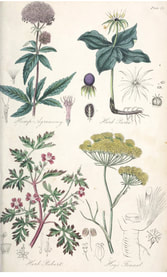 Working through menopausal symptoms can be a bit overwhelming. There’s often pressure to take synthetic hormones or investigate bioidentical hormones. It can be confusing. But is there another way to approach hot flashes, insomnia, depression, mood changes and more without hormones? Let’s look at herbal remedies and alternative therapies. Sage – looking at hot flashes and increased sweating, sage has been shown to decrease perspiration in over 60% of women who experience hot flashes (Bommer, 2011). This can be used in the form of tea and capsules. The recommendation is to take 1000mg two times a day. Sage is also known to assist with sinus infections, improving cognition and calming the central nervous system. Red Clover (wild plant belonging to the legume family) Kudzu (Pueraria Lobata aka Owhi) Soy (soybeans) I’m lumping all of these into the same paragraph. Each contains isoflavones - genistein, daidzein and puerarin. Isoflavones are compounds that act as weak estrogen receptor modulators. In treating hot flashes, the research is mixed. This is because gut bacteria has to convert daidzein into equol. Only ~40% of individuals can do this. This is why some women find that soy in the form of edamame and tofu helps with hot flashes while others don’t find assistance. It’s good to note that the isoflavones mentioned here could interact with anticoagulant and platelet medications. Also, not all soy is the same. St. John’s Wort – you often hear that this herb assists with well-being but a multitude of studies show that it can assist with hot flashes. Research indicates that after an 8-12 week period, improvements were shown. This was based on a dose of 300 mg taken three times/day. Please note that St. John’s Wart is metabolized in the liver and can interfere with the metabolism of many other drugs. Panax Ginseng – this is another mood stabilizer and assists with insomnia. Studies indicate that this herb was taken daily (200 mg) in the form of a standardized extract. Yoga – this ancient form of movement has been shown to assist with hot flashes, depression and insomnia. It activates the parasympathetic nervous system which assists with lowering heart rate, blood pressure and stress. Please note that “hot” yoga isn’t recommended since this can stress the body and create hot flashes. Meditation – meditation in the form of breathwork, mindfulness, utilizing the senses and more has been shown to reduce stress and activation the calm side of the central nervous system which can assist with mood, insomnia, hot flashes and more. Acupuncture – this ancient modality helps a great deal of symptoms. It assists with stress reduction, improving sleep, regulating hormones and reducing hot flashes. Over the years, I’ve recommended these remedies in addition to a few more. They are helpful in reducing sleepless nights, feeling cooler and improving mood and memory. I can personally attest to this as well as hearing the testimonials from so many women. As always, please consult your health care provider for your specific needs and ensure the supplements you take are high quality, pure and come from a reputable supplier. #mindbodyyou #herbs #menopause #alternativetherapy #sage #redclover #kudzu #stjohnswort #panexginseng #yoga #meditation #acupuncture #celestecooperpeel
0 Comments
Your comment will be posted after it is approved.
Leave a Reply. |
AuthorWrite something about yourself. No need to be fancy, just an overview. Archives
May 2024
Categories |

 RSS Feed
RSS Feed